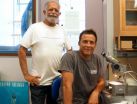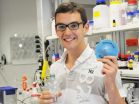(Press-News.org) AUDIO:
Some researchers are proposing that changing how medical care is delivered could help prevent multiple chronic diseases and extend healthy lifespan. The idea, they argue, would be to target the...
Click here for more information.
Medicine focuses almost entirely on fighting chronic diseases in a piecemeal fashion as symptoms develop. Instead, more efforts should be directed to promoting interventions that have the potential to prevent multiple chronic diseases and extend healthy lifespans.
Researchers writing in the journal Nature say that by treating the metabolic and molecular causes of human aging, it may be possible to help people stay healthy into their 70s and 80s.
In a commentary published July 24 in Nature, a trio of aging experts calls for moving forward with preclinical and clinical strategies that have been shown to delay aging in animals. In addition to promoting a healthy diet and regular exercise, these strategies include slowing the metabolic and molecular causes of human aging, such as the incremental accumulation of cellular damage that occurs over time.
The researchers, at Washington University School of Medicine in St. Louis, Brescia University in Italy, the Buck Institute for Aging and Research and the Longevity Institute at the University of Southern California, write that economic incentives in biomedical research and health care reward treating disease more than promoting good health.
"You don't have to be a mathematician or an economist to understand that our current health care approach is not sustainable," said first author Luigi Fontana, MD, PhD, professor of medicine and nutrition at Washington University and Brescia University. "As targeting diseases has helped people live longer, they are spending more years being sick with multiple disorders related to aging, and that's expensive," said
The diseases of old age — such as heart failure, diabetes, arthritis, cancer and Alzheimer's disease — tend to come as a package, the researchers write. More than 70 percent of people over age 65 have two or more chronic diseases. But, they noted, studies of diet, genes and drugs indicate that interventions targeted to specific molecular pathways that delay one age-related disease often stave off others, too.
"Heart failure doesn't happen all at once," Fontana said. "It takes 30 or 40 years of an unhealthy lifestyle and activation of aging-related pathways from metabolic abnormalities such as high blood pressure, high cholesterol and type 2 diabetes to give a person heart failure in his 60s. So we propose using lifestyle interventions — such as a personalized healthy diet and exercise program — to down-regulate aging pathways so the patient avoids heart failure in the first place."
His own research has highlighted potential benefits from dietary restriction in extending healthy life span. He has found that people who eat significantly fewer calories, while still getting optimal nutrition, have "younger," more flexible hearts. They also have significantly lower blood pressure, much less inflammation in their bodies and their skeletal muscles function in ways similar to muscles in people who are significantly younger.
Fontana and his co-authors also point out that several molecular pathways shown to increase longevity in animals also are affected by approved and experimental drugs, including rapamycin, an anticancer and organ-rejection drug, and metformin, a drug used to treat type 2 diabetes.
Numerous natural and synthetic molecules affect pathways shared by aging, diabetes and its related metabolic syndrome. Also, healthy diets and calorie restriction are known to help animals live up to 50 percent longer.
But it's been difficult to capitalize on research advances to stall aging in people. Fontana and his colleagues write that most clinicians don't realize how much already is understood about the molecular mechanisms of aging and their link to chronic diseases. And scientists don't understand precisely how the drugs that affect aging pathways work.
Fontana and his colleagues contend that the time is right for moving forward with preclinical and clinical trials of the most promising findings from animal studies. They also call for developing well-defined endpoints to determine whether work in animals will translate to humans. They are optimistic on that front because it appears that the nutrient-sensing and aging-related pathways in humans are very similar to those that have been targeted to help animals live longer and healthier lives.
But challenges abound. The most important change, they argue, is in mindset. Economic incentives in biomedical research and health care reward treating diseases more than promoting good health, they note.
"But public money must be invested in extending healthy lifespan by slowing aging. Otherwise, we will founder in a demographic crisis of increased disability and escalating health care costs," they write in Nature.
"The combination of an aging population with an increased burden of chronic diseases and the epidemic of obesity and type 2 diabetes could soon make healthy care unaffordable for all but the richest people," Fontana added.
INFORMATION:
Fontana, L. Kennedy BK, Longo V. Treat ageing: prepare for human testing. Nature, vol. 511 (7510), pp. 405-406. July 24, 2014
Washington University School of Medicine's 2,100 employed and volunteer faculty physicians also are the medical staff of Barnes-Jewish and St. Louis Children's hospitals. The School of Medicine is one of the leading medical research, teaching and patient care institutions in the nation, currently ranked sixth in the nation by U.S. News & World Report. Through its affiliations with Barnes-Jewish and St. Louis Children's hospitals, the School of Medicine is linked to BJC HealthCare.
Strategy proposed for preventing diseases of aging
2014-07-23
ELSE PRESS RELEASES FROM THIS DATE:
Sleep deprivation may increase susceptibility to false memories
2014-07-23
Not getting enough sleep may increase the likelihood of forming false memories, according to research published in Psychological Science, a journal of the Association for Psychological Science.
In a study conducted by psychological scientist Steven J. Frenda of the University of California, Irvine and colleagues, sleep-deprived people who viewed photographs of a crime being committed and then read false information about the photos were more likely to report remembering the false details in the photos than were those who got a full night's sleep.
Research has demonstrated ...
Satellite shows Atlantic Tropical Depression degenerate
2014-07-23
NOAA's GOES-East satellite captured imagery of the Atlantic Ocean's Tropical Depression 2 is it degenerated into a tropical wave on July 23.
At 1445 UTC (10:45 a.m. EDT), NOAA's GOES-East satellite captured an image of what was once Tropical Depression 2 (TD2), about 400 miles east of the Lesser Antilles. The GOES-East visible satellite imagery indicated that the depression weakened since July 22. TD2 appeared as just a weak swirl of clouds with no strong thunderstorms or deep convection. The GOES image was created by NASA/NOAA's GOES Project at NASA's Goddard Space Flight ...
Gene inhibitor, salmon fibrin restore function lost in spinal cord injury
2014-07-23
Irvine, Calif., July 23, 2014 — A therapy combining salmon fibrin injections into the spinal cord and injections of a gene inhibitor into the brain restored voluntary motor function impaired by spinal cord injury, scientists at UC Irvine's Reeve-Irvine Research Center have found.
In a study on rodents, Gail Lewandowski and Oswald Steward achieved this breakthrough by turning back the developmental clock in a molecular pathway critical to the formation of corticospinal tract nerve connections and providing a scaffold so that neuronal axons at the injury site could grow ...
Fires in the Northern Territories July 2014
2014-07-23
Environment Canada has issued a high health risk warning for Yellowknife and surrounding area because of heavy smoke in the region due to forest fires. In the image taken by the Aqua satellite, the smoke is drifting eastward along normal wind patterns. Fire is an obvious health hazard, but the smoke that comes from fires is not quite so obvious and its effects are insidious.
The smoke released by any type of fire (forest, brush, crop, structure, tires, waste or wood burning) is a mixture of particles and chemicals produced by incomplete burning of carbon-containing ...
Study links enzyme to autistic behaviors
2014-07-23
RIVERSIDE, Calif. — Fragile X syndrome (FXS) is a genetic disorder that causes obsessive-compulsive and repetitive behaviors, and other behaviors on the autistic spectrum, as well as cognitive deficits. It is the most common inherited cause of mental impairment and the most common cause of autism.
Now biomedical scientists at the University of California, Riverside have published a study that sheds light on the cause of autistic behaviors in FXS. Appearing online today (July 23) in the Journal of Neuroscience, and highlighted also on the cover in this week's print issue ...
This week from AGU: New Oso report, rockfall in Yosemite, and earthquake models
2014-07-23
From AGU's blogs: Oso disaster had its roots in earlier landslides
A research team tasked with being some of the first scientists and engineers to evaluate extreme events has issued its findings on disastrous Oso, Washington, landslide. The report studies the conditions and causes related to the March 22 mudslide that killed 43 people and destroyed the Steelhead Haven neighborhood in Oso, Washington. The team from the Geotechnical Extreme Events Reconnaissance (GEER) Association, funded by the National Science Foundation, determined that intense rainfall in the three ...
York University researchers use bird 'backpacks' to put wood thrushes migration on the map
2014-07-23
TORONTO, July 23, 2014 – Migratory songbirds are disappearing, and though conservationists are examining several possible reasons such as climate change, loss of habitat, acid rain and light pollution, a key piece of the puzzle has remained missing: where do these birds go once they leave their breeding sites, and what threats may they be encountering along the way?
To answer this question, a team of researchers out of York University have created the first ever migratory connectivity map produced for a songbird, using tracking from both breeding and winter sites. They ...
Diseases of another kind
2014-07-23
The drought that has the entire country in its grip is affecting more than the color of people's lawns. It may also be responsible for the proliferation of a heat-loving amoeba commonly found in warm freshwater bodies, such as lakes, rivers and hot springs, which the drought has made warmer than usual this year.
A 9-year-old Kansas girl recently died of an infection caused by this parasite after swimming in several area lakes. The amoeba enters the body through the nose of an individual and travels to the brain. Nose plugs can lower the odds of this rare but fatal pathogen ...
ETH student develops filter for clean water around the world
2014-07-23
Roughly 780 million people around the world have no access to clean drinking water. According to the World Health Organization (WHO), 3.4 million people die from water-related diseases every year. ETH student Jeremy Nussbaumer set himself the goal of making a contribution to solving this problem. Working with researchers from a group led by Wendelin Stark, head of the Functional Materials Laboratory, the 23-year-old spent a year researching a membrane filter and developing a prototype.
"What makes our DrinkPure filter unique is that you can screw it on to virtually any ...
Ketamine can be a wonder drug for ER patients and their physicians
2014-07-23
WASHINGTON -- For critically ill patients arriving at the emergency department, the drug ketamine can safely provide analgesia, sedation and amnesia for rapid, life-saving intubation, despite decades-old studies that suggested it raised intracranial pressure. The results of a systematic review of 10 recent studies of what many emergency physicians regard as a "wonder drug" are published online in Annals of Emergency Medicine "The Effect of Ketamine on Intracranial and Cerebral Perfusion Pressure and Health Outcomes: A Systematic Review."
"Apprehension for many years ...







